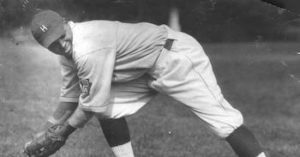
'Biz' Mackey
*"Biz" Mackey was born on this date in 1897. He was a Black baseball player and manager in Negro League baseball.
James Raleigh "Biz" Mackey was born in Eagle Pass, Texas, to a sharecropping family with two brothers. He began playing baseball with his brothers on the Luling Oilers, a Prairie League team, 1916 in his hometown of Luling. He joined the professional San Antonio Black Aces two years later. When the team folded in 1920, his contract was sold to the Indianapolis ABCs in time for the Negro National League's first season.
After three years, Philadelphia Hilldale picked him up when the Eastern Colored League was organized in 1923. In his first season with Hilldale, he batted .423, winning the ECL batting title and pacing the team to the pennant, and followed with eight consecutive seasons batting .308 or better. In 1924, he finished third in the batting race as Hilldale repeated as champions but lost to the Kansas City Monarchs 5 games to 4 in the first Negro League World Series, with Mackey playing third base. At first, platooning behind the plate while sharing time at shortstop with Pop Lloyd and Jake Stephens, he took over the full-time catching job in 1925.
In that year's Negro League World Series, Mackey helped Hilldale to the title over the Monarchs with a .360 average. He drove in the lead run in the 11th inning of the first game, which Hilldale won in 12 innings; after scoring the winning run in a 2–1 victory in Game 5, his three hits in the deciding Game 6 clinched the title. His barnstorming tours included a trip to Japan in 1927, during which he became the first player to hit a home run out of Meiji Shrine Stadium, doing so in three straight games. He was well-received on the tour and made later trips to Japan in 1934 and 1935. In 1931, he won his second batting title with a .359 average, as Hilldale also finished with the best record among eastern teams.
In voting for the first East-West All-Star Game in 1933, he was selected at catcher over the young Josh Gibson, batting cleanup. He would play in three more All-Star Games by 1938. In 1934, he batted only .299 as the Philadelphia Stars' won the NNL second-half pennant. However, he had a good postseason, batting .368 and driving in the first run of a 2–0 victory in Game 7 to defeat the Chicago American Giants 4 games to 3. By 1937, he was managing the Baltimore Elite Giants, where he began mentoring 15-year-old Roy Campanella in the fine points of catching. Campanella later recalled:
"In my opinion, Biz Mackey was the master of defense of all catchers. When I was a kid in Philadelphia, I saw both Mackey and Mickey Cochrane in their primes, but for real catching skills, I don't think Cochrane was the master of defense that Mackey was. When I went under his direction in Baltimore, I was 15 years old. I gathered quite a bit from Mackey, watching how he did things, how he blocked low pitches, how he shifted his feet for an outside pitch, how he threw with a short, quick, accurate throw without drawing back. I got all this from Mackey at a young age."
Mackey joined the Newark Eagles in 1939, replacing Dick Lundy as manager a year later, and continued his work with young players such as Monte Irvin, Larry Doby, and Don Newcombe. Personality conflicts with Newark owner Effa Manley led to Mackey's departure from play after the 1941 season. Still, he returned to the field in 1945 and managed the team in 1946 as the Eagles won the Negro League World Series 4 games to 3, again over the Monarchs, who featured pitcher Satchel Paige. Even in his 40s, Mackey was still an effective player; he batted .307 in 1945 and appeared in the 1947 All-Star Game at age 50.
When the Eagles moved to Houston in 1950, he retired from baseball following the season. In the 1950s, he moved to Los Angeles and began working as a forklift operator. In 1952, he was selected by a Pittsburgh Courier poll as the Negro leagues' greatest catcher, ahead of Josh Gibson. Mackey received more attention on May 7, 1959, when Campanella was honored at the Los Angeles Memorial Coliseum following his paralysis from a car accident. Mackey was introduced to a crowd of over 93,000 for an exhibition game between the Dodgers and the New York Yankees. He lived in Los Angeles until his death on September 22, 1965. He is buried in that city's Evergreen Cemetery. Biz Mackey was elected to the Baseball Hall of Fame in 2006.